Honor Him
You can be everything to your daughter except her father.
My therapist’s voice echoed in my head for weeks after she spoke this sentence. As a struggling single mother, it was not an opinion I wanted to hear. I was spending every ounce of energy, will, and intellect trying to figure out how best to optimize my visually-impaired second daughter’s life. I already felt like I wasn’t doing enough. I didn’t want to acknowledge that on a fundamental level, I simply couldn’t be enough.
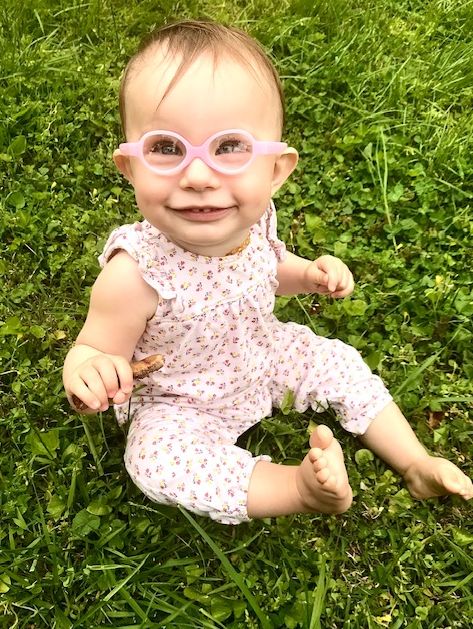
As a child of divorce, I didn’t develop a real connection with my own father until I was 16. I was largely raised with a “do it all yourself” attitude that could be dismissive of men, fathers, brothers, husbands, and the role they played in the raising of children. To further complicate matters, my first marriage resulted in the lived experience of raising my first daughter virtually alone, even though her father lived in the same house.
For most of my life, Father’s Day has felt like an afterthought. I grew up thinking that it was one of those fluffy holidays–like St. Patrick’s Day or Valentine’s Day–like, despite the pretense of equality, it just wasn’t as important as Mother’s Day.

American attitudes seemed to affirm this perception. As a culture, we are widely dismissive of fathers and tend to diminish the role that they play in the raising of children. We propagate stereotypes about golfing, fishing, and grilling outside as though the approved zone of father-child interaction is that of recreation. Contrarily, fathers can also be shoveled into the role of disciplinarian, arriving home from putting out fires at work to being asked to put out more fires at home.
The disconnect is powerful and obvious to everyone, but no one likes to talk about it. A father cannot be expected to compartmentalize his role into the Dr. Jekyll/Mr. Hyde dichotomy of Disneyland Dad/disciplinarian. These two faces of fatherhood provide, at best, a black-and-white sketch of the oil-on-canvas masterpiece that is the parent-child relationship. And yet, we seem to both expect dads to exclusively fill these two roles and simultaneously exonerate them from all other child-rearing responsibility.
It’s really strange when you think about it, but I didn’t think much about it until I married my husband, Peter. I believed that men typically checked out of parenting until the child was at least 5, but Peter was determined to forge a real relationship with my developmentally-delayed and visually-impaired 2-year-old from the start.
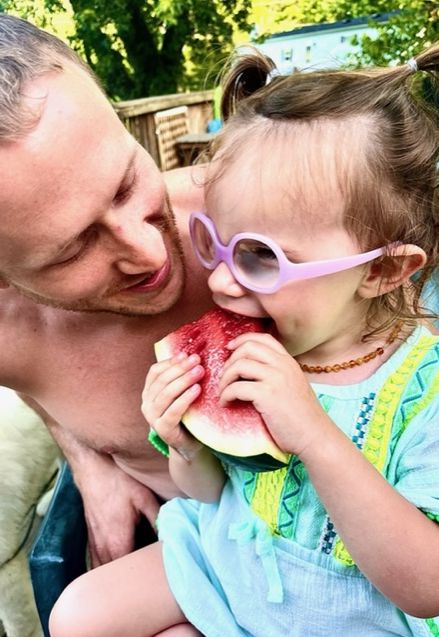
My second daughter, Cecilia, has known no other father than Peter. Peter taught her how to hold baby ducks, chicks, and quail and how to jump on a trampoline and run through the grass. He taught her how to use a napkin, eat with a fork, wash her hands, and get dressed by herself. They’ve built their relationship based on Cecilia growing more determined, day by day, to show Peter how much she can do by herself.
Peter’s 7-year-old son, my stepson, wants to be just like his dad. He cuts his hair like his dad and dresses like his dad and gardens with his dad. Together, they started our family’s vegetable garden from seed and, together, they tend it daily, weeding and watching for pollinators, turning on the sprinklers, chasing off rabbits, and harvesting Cocozelle zucchini and Crookneck summer squash. Together, they scour the beach for perfectly round stones, crab claws, osprey feathers, and fossilized shells. Side by side, they build bonfires and butcher quail; they vacuum and make salads; they mow the lawn and slow-smoke pork shoulders on the charcoal grill.


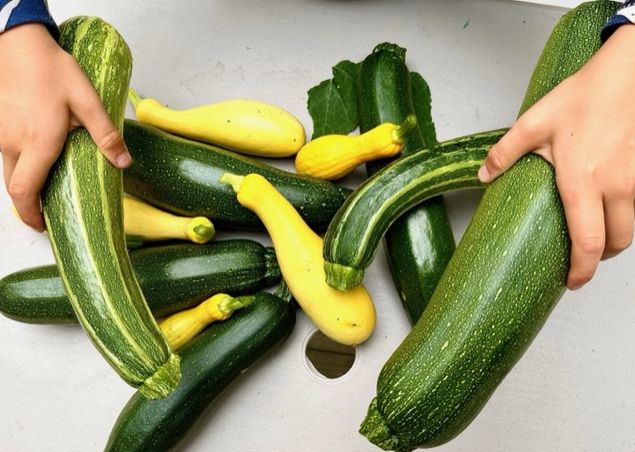
Peter was the first person to hold our 6-month-old daughter, catching her and crying as she was born next to our bed. In the mornings and evenings, she gurgles at him with toothless smiles and starlit eyes, and he gazes at her in pure adoration, murmuring that she makes him happier than he ever dreamed he would be. During the days, she rides on his chest, and, together, they plant microgreens and feed quail and do the dishes. Sometimes, they read books or play with musical instruments with her big brother and big sister. And sometimes, she turns away from my breast in milky delirium to find and hold Peter’s hand as she drifts off to sleep.

This past weekend, my little brother and his wife visited us and had fun playing with the kids on the beach and trampoline. The two older kids delighted in the attention, but our baby daughter’s face crumpled in anxiety each time my brother tried to engage with her. I reassured him that it was very normal for infants, especially female infants, to feel insecure when encountering an unfamiliar male. He asked me later if this held true for a female infant with her own father.
In thinking how to answer this, I wanted to laugh and cry at the same time. How could I convey the whole history of my first daughter crying anytime her father picked her up? How could I describe Cecilia’s intense preference for me until Peter entered her life? How could I communicate that my infant daughter was born to a father who loves and desires her just as much as I do–and she knows it? In the end, I simply smiled and said, “Not if he’s involved from the start.”
My parents divorced when I was 7, and I have very few memories of my father from my early childhood. Beginning at 16, my relationship with my father has matured, blossomed, and deepened throughout the past 20 years. When I was 19, my father visited me during my semester abroad in Ireland, and together, we kissed the Blarney stone and strolled the Cliffs of Moher during sunset. At 26, my father walked me down the aisle, and at 33, my father walked me through my divorce. He held my first daughter’s tiny hand while we explored botanical gardens in Florida and then held me in the hospital while she went into cardiac arrest. He sat by my side while the NIH doctors told us that Cecilia’s genetic disorder likely impacted one of her vital organs and then sat Cece on his lap to read her The Gunniwolf and make her giggle with his Donald Duck voice.
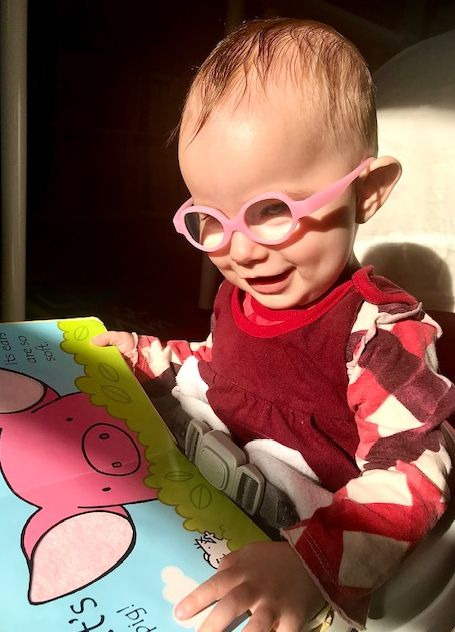
During my darkest years, my father’s hope and belief in me anchored me as nothing else could. It is not an exaggeration to say that I don’t believe Cecilia and I would be here today if not for my father’s support. He is a man who has prioritized his children above himself again and again and again. For most of my adult life, he has been the person I want to turn to when my dreams are coming true or when my life is turning into a nightmare.
My father welcomed Peter as his son and welcomed Peter’s son as his grandson. He cried on our wedding day in joy that we had found each other and cried the first time he held our infant daughter–his 5th grandchild. I could not ask for a better father for myself or a better grandfather for my children. But if you were to ask him how he feels about himself as a father and a grandfather, he would say he’s doing the best he can and ask how he can do better.
Our culture encourages men like my father to disconnect and distance themselves from needy adult children. Our culture calls men like Peter “Mr. Mom” because it considers fathers incapable of nurturing infants and toddlers. For so many fathers, Father’s Day is mere pageantry acknowledging some biological relevance. It can feel empty of authenticity, sincerity, and gratitude.

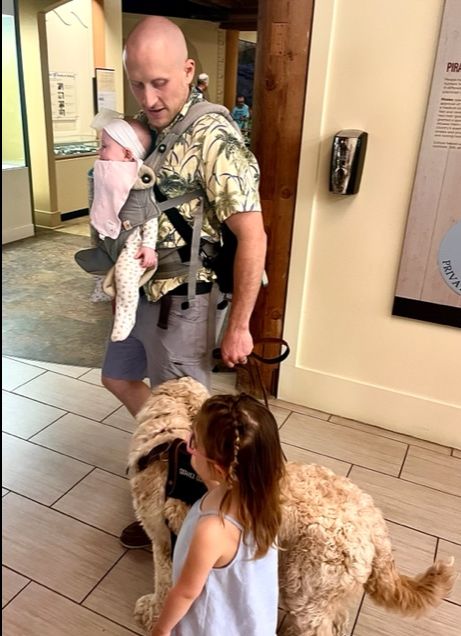
In a culture that prioritizes income and indulgence, fathers are just as unseen and unheard as mothers–but in a totally different way. Their relevance is questioned; their role feels uncertain, their presence deemed unnecessary. According to the Census Bureau, approximately 20.2% (some 7 million) fathers are absentee fathers, while less than 6% (some 2 million) are single or “solo” fathers.
For those fathers who are neither absentee nor single, it can seem like the younger the child is, the more uninvolved the father is. Many fathers leap at the passing comment, “Oh, she has your eyes!” as confirmation of his genetic contribution. A mother knows her child because she gives birth to her child, but paternity uncertainty can impact the amount of resource investment the father is or is not willing to give to the child.
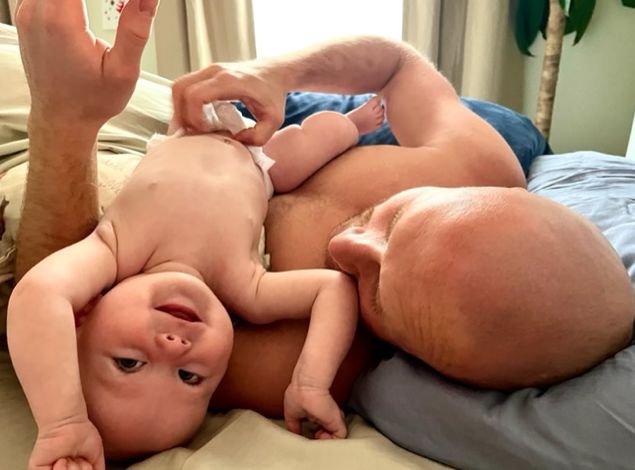
Fatherhood is emotionally complex because it happens external to the father’s body. In so many ways, he initiates the process of life, then is asked to wait for his generative force to blossom into fruition. If he remains present for the duration of the pregnancy, birth, and postpartum period, his prolactin levels will increase and his testosterone levels decrease, allowing him to prioritize parenting over reproductive behavior.
Although he is the generative source, he is neither the developmental nor the nutritive force for his offspring. As a result, he needs to discover a different kind of connection with his infant. Across mammalian species, this manifests in play and other socio-emotional interactive behavior that helps prime the infant for later life. But prolactin–the nursing hormone–also enables the new father to engage in nurturing, face-to-face contact that builds the foundation for secure attachment later in life.
As humans, we are always seeking ways to make life simpler and more comprehensible. But, in some ways, the logical and intuitive answers are also the most mysterious and complex.
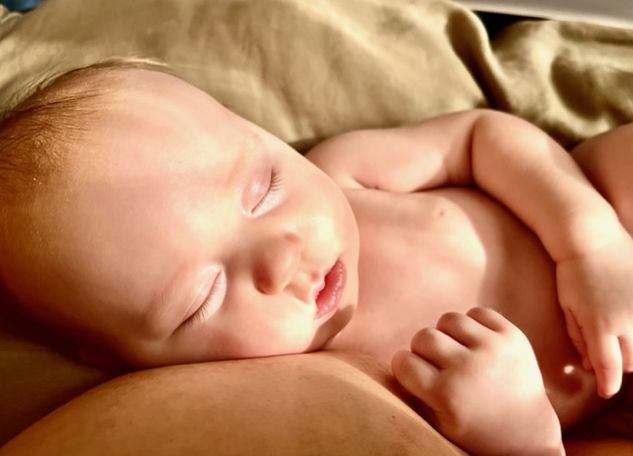
It takes a mother and a father to make a child, and it takes a mother and a father to raise a child.
Especially in today’s culture, it is so hard to acknowledge this reality, and as a single mother, I starkly refused to acknowledge it. I wanted to believe that I could be everything to Cecilia and that she didn’t need a father to have a happy and successful life.
In the past 2 years, Cecilia has gained a father, a big brother, a little sister, and a service dog. Her world has expanded so dramatically, and she has adapted, matured, and bloomed in ways I didn’t believe she could. From the beginning, Peter refused to treat her any differently because of her genetic condition. He has pushed her to discover her own strength and autonomy in ways that I never would have, and she has taken to this new independence like a bird to wing.
There are days that I wake up and listen to Cecilia telling Peter about what her stuffed Flamingo did last night and how Big Elephant wants to go to the beach with her. I hear her say again and again, “I can do it, Dad,” and “I did it, Dad!” Most of the time, I smile silently, but, sometimes, I close my eyes against a rush of tears and think about what Cecilia’s life would have been like had Peter never entered it. Instead, the little person that she is becoming is inextricable from her identity as Peter’s daughter.
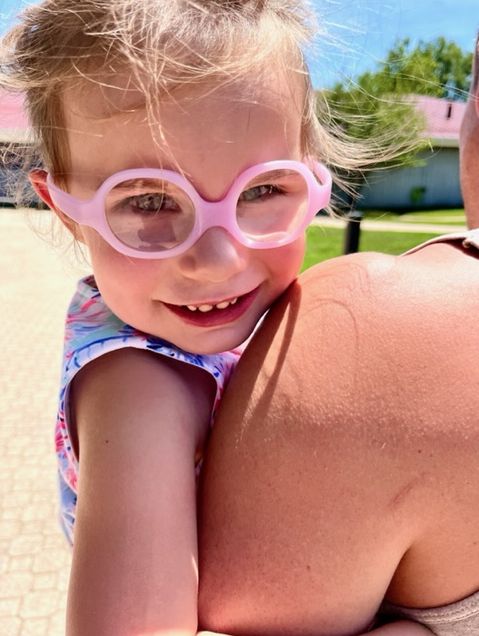
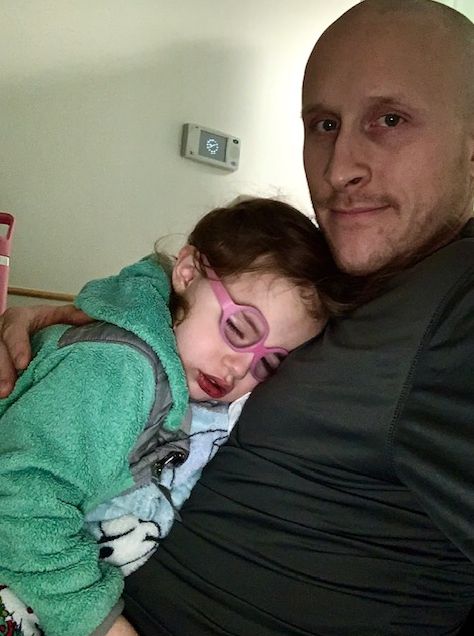
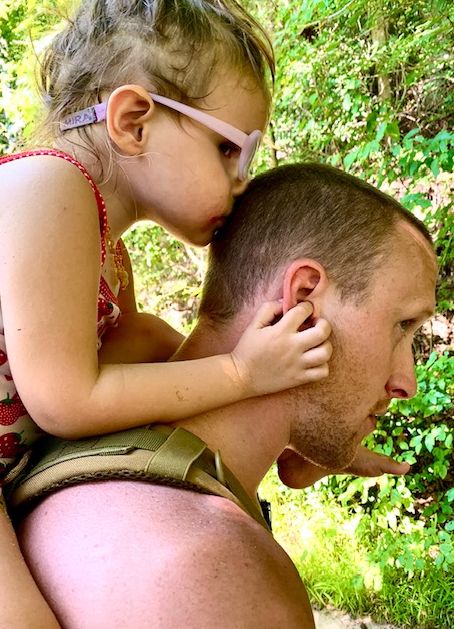
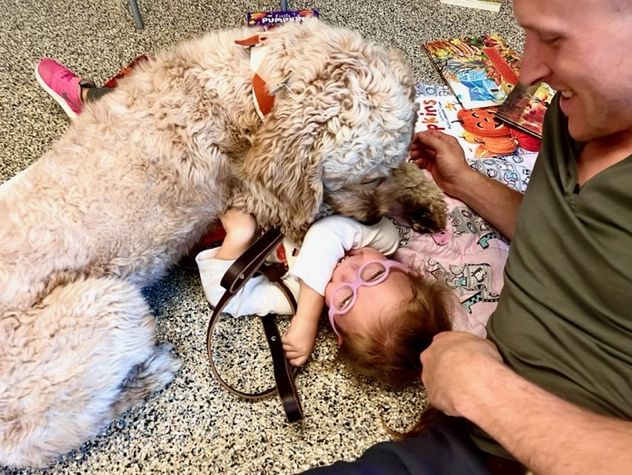
I don’t pretend that there is no pain in this for me. For most of her life, I was the sun around which Cecilia’s universe rotated. Since marrying Peter, I have watched her evolve as a little sister, a big sister, and a daughter to a father who asks her to take off her glasses so that he can kiss her eyes one by one. In recent months, she has begun to turn to Peter for approval and reassurance even when I’ve already given it to her. Her need for me and dependence on me is decreasing, even as the amount of time and energy I need to give to her baby sister is increasing. It is a new experience of motherhood for me–one that is brutal and beautiful and blinding with clarity.
I would not be the mother or wife that I am today if not for my father. Cecilia would not be the extraordinary, irreplaceable little person that she is today without Peter. His fatherhood of her has activated dimensions of her identity that I could never have imagined–and she has softened and deepened him in return, teaching him patience even when he felt he had no patience left to give.
Yesterday, we had a breakfast of bacon, eggs, grapefruit, and zucchini in our gardens before mass. In the afternoon, we munched on fresh coconut and played Ocean Bingo as a family. Our son gifted his dad with an “About my Dad” questionnaire, and the two older kids played with our baby chicks. Peter fell asleep last night saying that he finally feels a peace he’s been seeking for most of his life.
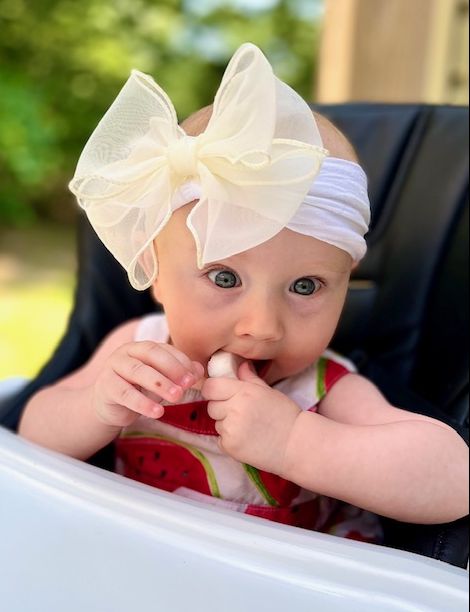
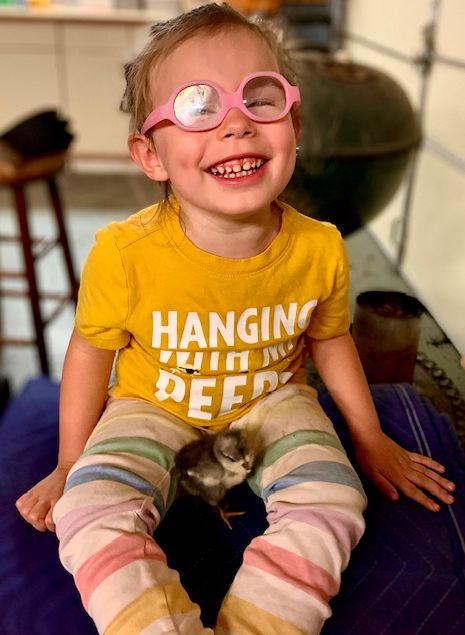
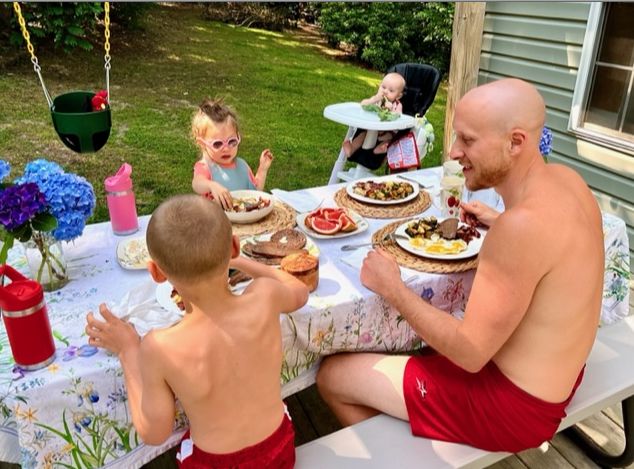
I too struggle with peace and surrender, but I am also more at peace now than I ever have been before. At birth, I was gifted with an incredible father, and now, I am gifted with an incredible husband who is daily teaching me how to be a better mother to our children. I do not have words to thank them.
Instead, on this day that honors fathers, I will honor my father and the father of my children. I will honor those single fathers who choose to stay against all odds and those fathers who choose to raise abandoned, orphaned, and fostered children. I will honor the fathers whose wives have died in childbirth and the fathers who are raising stepchildren. I will honor all fathers who are struggling to give their children identity and integrity in an increasingly fatherless world.
I honor you, and I ask you to remember the power you have to help your children become better sons and daughters and help your wives become better mothers. Do not let the world tell you that you don’t matter.
Your children don’t agree.


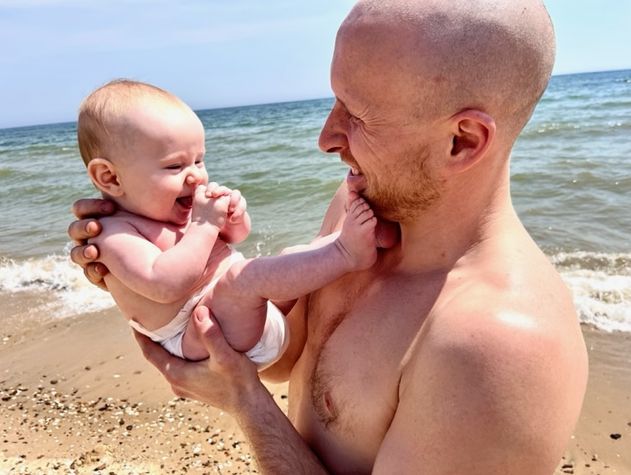
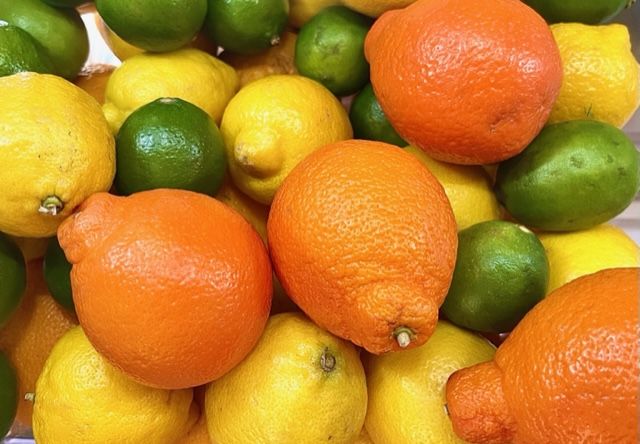
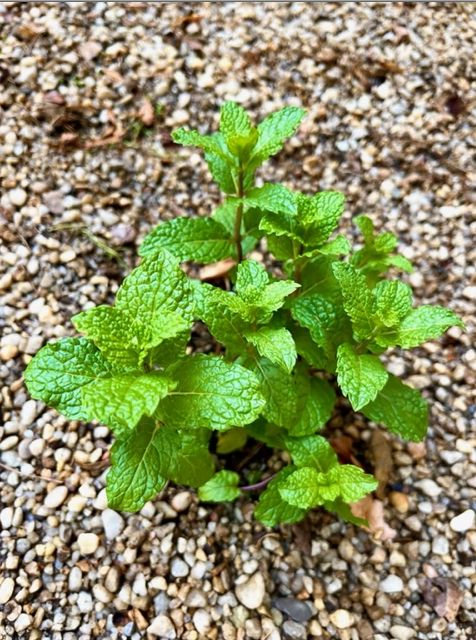


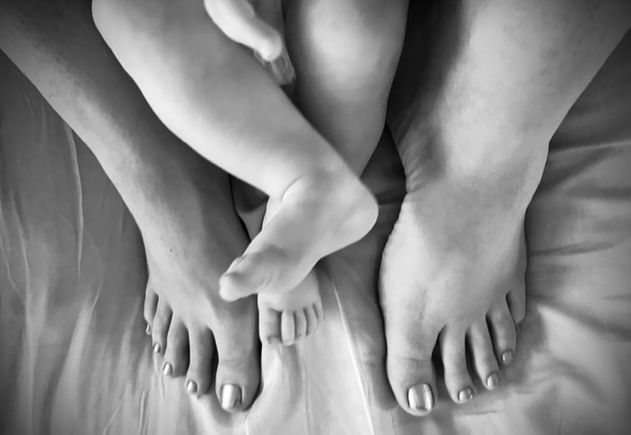
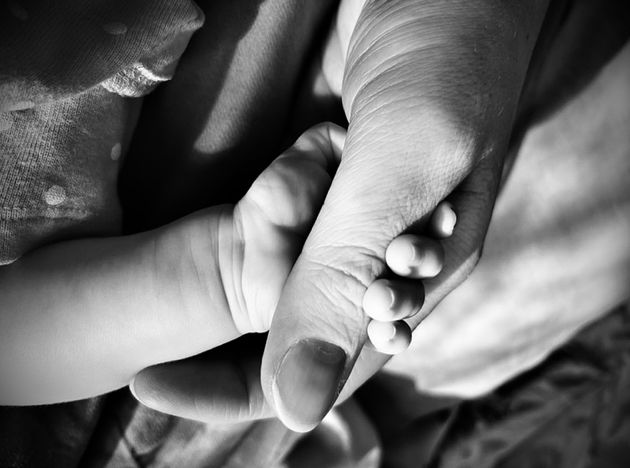
Fatherhood is immensely rewarding for me. I have a large family of children, grandchildren, and in-laws, all of whom I care for deeply and unconditionally. Your post once again reduced me to tears. You have a unique ability to articulate ineffable feelings. Thank you for all that you do.